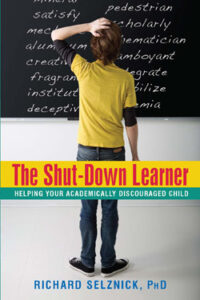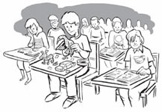I In last week’s post, I made the following statement as part of the primer on reading:
In last week’s post, I made the following statement as part of the primer on reading:
- “Whether in the classroom or in tutoring for struggling children scattershot remediation will not be effective for either Type I or Type II categories.”
A parent contacted me who read the blog (nice to know that someone is reading them) asked what was meant by “scattershot.”
Here’s my take.
When tutoring children who show mild, moderate or severe Type I issues ( Type I or Type II ), remediation should be laser focused. There would be little teaching of comprehension or engaging children with activities such as open-ended writing (e.g., “Write about your weekend.”).
When a teacher was asked by a mom what approach was being used with her child showing significant deficits with word identification, decoding and reading fluency, the response was, “I do a little of this and a little of that – we do some comprehension with stories, some practice with reading out loud and writing imaginative stories.”
Sports analogies are helpful in countering a scattershot approach.. Let’s take tennis (although any sport would apply).
While playing a game of tennis is certainly more fun than working on basic skills, in the hands of a good instructor skill targeting would predominate.
If the tutor is not clear on the approach and is scattershotting, you may want to reconsider and find someone else.
Takeaway Point
Good testing data should help you get clear on what needs to be emphasized in remediation. Be laser focused in your approach so you can hit the right target,
(***Please note: Blog posts represent the opinion and perspective of Dr. Richard Selznick. Comments and questions are welcomed, but are blocked by the hosting site. Please email questions or comments: rselznick615@gmail.com)
 Copyright, Richard Selznick, Ph.D. 2022, www.shutdownlearner.com.
Copyright, Richard Selznick, Ph.D. 2022, www.shutdownlearner.com.
To Contact Dr. Richard Selznick for advice, consultation or other information, email rselznick615@gmail.com.
To receive future blog posts, register your email: https://shutdownlearner.com.

 As we discussed last week (
As we discussed last week ( In my corner of the universe most of the issues that are brought to me include some variation on the following:
In my corner of the universe most of the issues that are brought to me include some variation on the following: When you are a parent in struggling “Child Land,” there are all kinds of theories, hypotheses and explanations as to why children do what they do.
When you are a parent in struggling “Child Land,” there are all kinds of theories, hypotheses and explanations as to why children do what they do. A book that always stayed with me reminding me of my early days as a psychologist at the Hill Top Preparatory School, a private school in the Philadelphia Suburbs for high schoolers with learning disabilities, is Betty Osman’s, “No One to Play With: The Social Side of Learning Disabilities.” Even though the book came out in the mid 1980’s, it’s as relevant today as it was then.
A book that always stayed with me reminding me of my early days as a psychologist at the Hill Top Preparatory School, a private school in the Philadelphia Suburbs for high schoolers with learning disabilities, is Betty Osman’s, “No One to Play With: The Social Side of Learning Disabilities.” Even though the book came out in the mid 1980’s, it’s as relevant today as it was then.